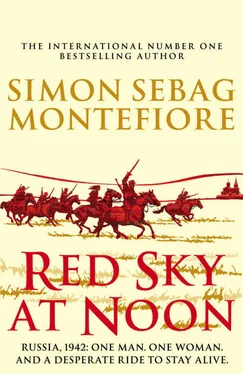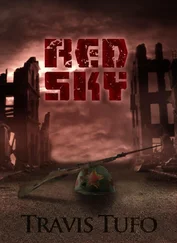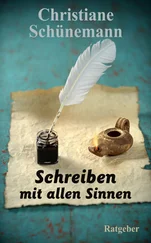‘Where’s Koshka?’ asked Zhurko the next morning, but they all knew the answer.
It was dawn. The night had been sweltering. The men were sweating even though the sun was not up. Garanzha and Little Mametka stood near the horses, smoking Italian cigarettes. Beyond them, down the slope a little, lay Koshka, curled up like a child, hands stiffening already. The men followed Zhurko and stood around Koshka, looking down at him. Blackened blood ridged across his neck. Just saying, thought Benya, just saying.
Garanzha was calm, calmer than any of them. ‘I like to know who I ride with,’ was all he said, and he walked back to the campfire, now little more than ashes.
Benya wondered if Zhurko would say something, but he was arranging Koshka’s belongings: PPSh, dagger, mess-tin, spurs, boots and quirt were all laid out in a neat row. ‘Choose a gift,’ said Little Mametka, and Benya got a second Papasha.
The fear was gathering like a bundle of wire in Benya’s belly. He had slept deeply under the stars, without a thought, utterly exhausted, but when he awoke, he was sickened by what they had to do this day, and he felt the flickering of terror in every joint, as if his very bones were resetting and tightening inside him.
Sergeant Panka boiled the coffee and shared out the dried meats from the village and the ration of biscuit. No one mentioned Koshka again. Ten minutes later the seven rode out, guinea fowls and partridges scattering before them. The woodpecker tapped; skylarks swooped; howitzers boomed on the Don.
They moved cross-country towards the village of Novi Petroshevo, keeping to the fields of sunflower and maize, riding to the lane that led from Shepilovka, Mandryka’s headquarters. As they loped, they could hear music and shouting. The Schuma were celebrating, Zhurko told them, and Mandryka was unlikely to wake up early so the plan was to be in position when he headed out. If they missed him, they would catch him on the way back. Benya had started the day on edge, shaking with nerves, but as they rode through the heat, he began to daydream, to let Silver Socks find her way behind the others.
Just as they were riding through a defile of poplar trees, Socks’s ears went forward and she tensed. Benya was suddenly awake and he put his hand on the round drumlike magazine of his Papasha just as the Cossack voice said: ‘Who’s that? Stop right there!’ Around Benya, the men were reaching for their guns.
‘Too late! Don’t move! Keep your hands up or we’ll kill you all!’
Zhurko turned to his unit: ‘He’s right.’
In front of them, men emerged out of the maize. Behind them, the black snouts of guns were raised.
‘Who are you?’ said a man, wearing Russian fatigues but holding a German Schmeisser. Benya guessed he was the commander but were these Mandryka’s thugs? The seven Shtrafniki froze but kept their guns levelled.
‘We’re Red Army,’ said Zhurko.
‘What unit?’
‘Second Cavalry Shtrafbat.’
‘I see your pips,’ said the man. ‘Identify yourself.’
‘Leonid Zhurko. Captain, penal rank.’
Just then a lanky young man pushed forward. ‘Major Elmor, it’s them,’ he said. ‘I can vouch for them.’
It was ‘Grasshopper’ Geft, a youngster who had vanished a day earlier from the Shtrafbat along with the vet Lampadnik and a couple of others Benya recognized.
‘You’re sure?’ said the man they called Elmor.
‘Sure.’
‘All right. Dismount, Zhurko. Slowly!’
Zhurko stayed put, and gestured to his unit to do the same. ‘I need to know who you are.’
‘Partisans, Second Don Brigade.’
‘I didn’t know there was a First Brigade.’
‘There isn’t. We’re the remnants of the Kharkov encirclement a month ago. We have orders to intercept you; Stavka sends regards to Melishko with reference to your last order concerning Operation Pluto.’
Benya felt Zhurko’s relief. They were who they said they were: Soviet partisans in contact with Stavka in Moscow.
‘Is Melishko with you?’
Zhurko just shook his head and Elmor understood.
‘Where’s the rest of your battalion?’
‘We’re it, but we’re alive.’ Zhurko dismounted and shook Elmor’s hand. The partisan officer was built like a low-slung cooking pot, Benya thought, with a bald head topped with tousled strands of blonde-grey hair that flapped like the earmuffs of a shapka hat. He and the others dismounted and they hugged the skinny Geft with real joy.
Elmor crouched down on his haunches like a Kazakh and Zhurko sat cross-legged. Benya noticed Elmor wore five grenades around his belt.
‘What are your orders concerning my unit?’ Zhurko asked.
‘Moscow radioed us. Stavka informed us you were alive and needed support, and we had a message for Melishko, restoring him to his rank of general but… Well, anyway, we’ve been looking for you.’
‘If I’m honest,’ replied Zhurko, ‘there are just seven of us and we’re all that’s left of an offensive close to the Don.’
‘We would invite you for pirozhki , shchi and vodka; take you sightseeing; introduce you to the local girls,’ said Elmor without smiling, ‘but this area is crawling with hostile forces of every stripe. You had a mission here?’
‘To eliminate Mandryka.’
‘Us too. Headquarters has ordered his assassination, whatever the cost. I have men watching him and his people.’ Elmor paused. ‘You hear that shooting? That’s a German unit engaged in what they call “anti-partisan aktions ”.’
‘They’re hunting you?’
‘No. Their “anti-partisan measures” usually involve killing Jewish women and children or innocent peasants. And they are assisted by Romanian forces in the area. They’re across this field and right beside the lane Mandryka will take, so we can’t attack Mandryka with them in our rear, or shoot it out with them. A firefight would attract Mandryka and the Germans.’ He looked around at Zhurko and his Cossacks. ‘How are you with cold steel?’
Spider Garanzha drew his sabre. So did the others.
‘Keen,’ said Elmor. ‘I’m impressed.’
Svetlana Stalina found the letter waiting for her when she got back from school. Even her nanny was excited.
‘Could it be from him ?’ her nanny said, flush-cheeked with anticipation.
Svetlana opened it in the sitting room.
Dear Svetlana,
How kind of you to write. Your letter made my day and I have reread it several times. It arrived soon after the attack by the penal battalion that I described in my most recent article. They were so brave, these Criminals and mavericks, and I saw them charge the Fascists. I knew one of them, an old friend, a writer, but I didn’t get a chance to talk to him. But I was happy to see him. Sadly they were almost wiped out and very few made it. I admit I was a little broken-hearted. I waited for them to come back but none came. I hoped to see my friend but no, nothing, and even though I am accustomed to the tragedies of this war, I was upset and moved. I admit I wept and then your letter arrived. It comforted me and restored my faith in life. It was so charming and right now, as I sit in the bunker here with the leaders and generals on the Stalingrad Front, I am thinking of you. You may be in Moscow faraway, and I don’t even know you, but I feel your passion and your love of writing and literature. I doubt we will ever meet but would I be crazy if I hoped that we can correspond? And maybe one day, we might talk about literature?
Write soon.
Lev Shapiro
Svetlana screamed with joy. Lev Shapiro had responded in such a warm fashion. He’d confided in her, shared his feelings and emotions with her, welcomed her letter.
Читать дальше












